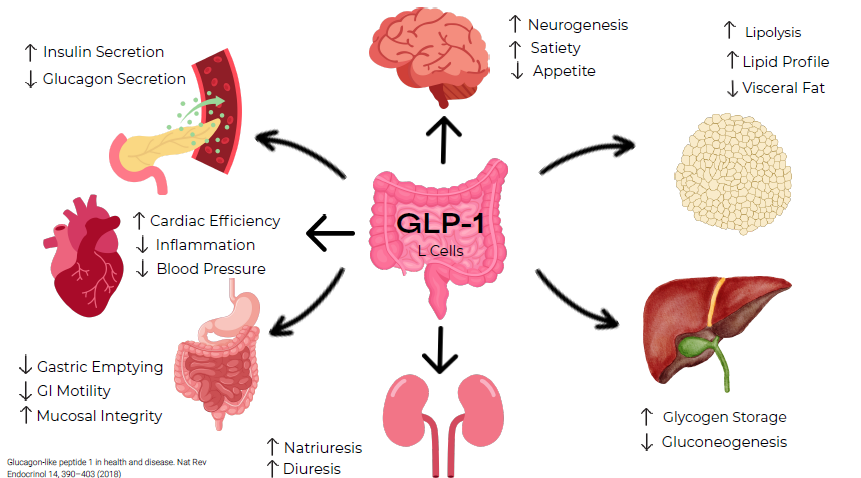GLP-1 and Gut Health: Addressing Metabolic Dysfunction
Managing metabolic dysfunction is a growing challenge for healthcare providers, but new advances in GLP-1 therapies and gut health optimization offer promising solutions. These insights were shared during Access Medical Labs' recent AccessLive Webinar with Dr. Susan Lovelle. The webinar explored how integrating evidence-based treatments with holistic strategies can empower physicians to deliver transformative care.
This Article at a Glance:
- GLP-1 Therapies: Effective for weight loss (up to 15% body weight), enhanced insulin sensitivity, and cardiovascular health improvements.
- Gut Health's Role: 70% of the immune system resides in the gut, directly influencing hormonal balance and systemic wellness.
- Key Metabolic Challenges: Chronic stress, poor diet, and toxins disrupt gut microbiome, leading to inflammation and metabolic dysfunction.
- The 5R Framework for Gut Health Restoration:
- Remove: Eliminate inflammatory foods and toxins.
- Replace: Add digestive enzymes and bile acids.
- Reinoculate: Introduce probiotics and prebiotics.
- Repair: Strengthen the gut lining with L-glutamine, omega-3s, and vitamins.
- Rebalance: Build sustainable habits like stress management, better sleep, and improved diet.
- Lifestyle Interventions: Stress reduction, sleep hygiene, and dietary adjustments are critical for success.
- Diagnostic Tools: Use CGMs, metabolic panels, and stool tests for personalized care.
- Integration Strategy: Combine GLP-1 therapies with holistic approaches to address both immediate symptoms and underlying causes.
The Growing Crisis of Metabolic Dysfunction
Metabolic dysfunction and obesity have become urgent global health crises, with U.S. obesity rates exceeding 40%. According to Dr. Susan Lovelle, an expert in lifestyle medicine and holistic health, this trend isn’t just about weight—“It’s about the increasing prevalence of related conditions like cardiovascular disease, Type 2 diabetes, and hormonally driven cancers.” In her recent presentation for AccessLive, our educational webinar series for physicians, she stresses that these challenges are compounded by lifestyle factors such as chronic stress, poor diet, and insufficient sleep, all of which contribute to systemic inflammation and metabolic imbalances.
The Potential of GLP-1 Therapies
One of the most promising advances in addressing these issues is GLP-1 therapy. Dr. Lovelle explains that glucagon-like peptide-1 (GLP-1) is “a naturally occurring hormone crucial for regulating blood sugar, appetite, and insulin secretion.” Synthetic versions like semaglutide and tirzepatide have demonstrated remarkable efficacy. Clinical trials show weight loss outcomes of up to 15%, with additional benefits including reduced A1C levels and cardiovascular improvements
Key Benefits of GLP-1 Therapies:
- Enhanced insulin sensitivity
- Lower blood sugar levels
- Reduced visceral fat and improved lipid profiles
- Improved cardiovascular health
-
Decreased inflammation linked to chronic disease

Source: Glucagon-like peptide 1 in health and disease. Nat Rev Endocrinol 14, 390–403 (2018)
However, Dr. Lovelle cautions, “While these therapies are transformative, they should never be used in isolation. The root causes of metabolic dysfunction must also be addressed for sustainable results.”
The Gut’s Role in Metabolic Health
A key element of sustainable care lies in optimizing gut health. Dr. Lovelle highlights the gut’s central role in metabolism, explaining that “about 70% of the immune system resides in the gut, and its health directly impacts hormonal balance, inflammation, and systemic wellness.” Chronic stress, poor diet, and environmental toxins can disrupt the gut microbiome, leading to increased intestinal permeability and inflammation.
Gut-Health Disruptors:
- Chronic stress alters gut flora within 24hrs, increasing inflammation and cortisol levels.
- Dysbiosis impairs incretin signaling, reducing the effectiveness of GLP-1 therapies.
- Poor diet contributes to a “leaky gut” and systemic inflammation, exacerbating metabolic disorders.

Source: "The GLP-1 Drug Boom & Gut Microbiome's Role in Metabolic Dysfunction" - Dr. Susan Lovelle
“What we see is a cascade effect,” she notes, “where gut dysfunction exacerbates metabolic issues, and metabolic dysfunction further harms the gut.”
The 5R Framework for Gut Restoration
To address these challenges, Dr. Lovelle advocates for the "5R Framework" for gut health restoration. “The process is straightforward but powerful,” she explains.
The 5R Framework:
1. Remove: Eliminate inflammatory foods and toxins.2. Replace: Introduce digestive enzymes and bile acids for nutrient absorption.
3. Reinoculate: Reintroduce beneficial bacteria with probiotics and prebiotics.
4. Repair: Fortify the gut lining with L-glutamine, omega-3s, and essential vitamins.
5. Rebalance: Establish sustainable habits like better sleep, stress management, and dietary consistency.
Practical Lifestyle Interventions
Dr. Lovelle emphasizes that lifestyle interventions are critical to long-term success. Chronic stress, for example, can trigger gut inflammation and increase cortisol, further impairing metabolic health
Lifestyle Recommendations:
- Stress Management: Mindfulness, meditation, or wearable tech to reduce cortisol levels.
- Sleep Optimization: Aim for 7-9 hours of uninterrupted rest. Address circadian disruptions with proper sleep hygiene and blue-light blocking techniques.
- Dietary Adjustments: Focus on whole, fiber-rich foods. Avoid the Standard American Diet (SAD), which is linked to increased gut inflammation and systemic risks. “It’s not about deprivation; it’s about giving the body what it recognizes as fuel,” Dr. Lovelle explains.
Advanced Tools for Tailored Care
For practitioners seeking to enhance care, diagnostic tools play a pivotal role. These tools not only guide treatment decisions but also monitor progress effectively:
Recommended Blood Tests and Diagnostics:
- Comprehensive Metabolic Panel: Evaluate electrolyte balance, kidney function, and liver enzymes.
- Continuous Glucose Monitoring (CGM): Track glucose trends and identify insulin resistance.
- Fasting Insulin and A1C: Assess baseline insulin sensitivity and long-term glucose management.
- Thyroid Function Tests (TFTs): Rule out thyroid-related contributors to metabolic dysfunction.
- Inflammatory Markers: Include CRP and homocysteine to measure systemic inflammation levels.
- Comprehensive Stool Analysis: Identify gut dysbiosis, pathogenic bacteria, or yeast overgrowth
“Data-driven insights empower both the physician and the patient,” Dr. Lovelle asserts. “When patients can see the connection between their habits and their health metrics, it’s transformative.”
Integrating GLP-1 with Holistic Strategies
Dr. Lovelle also addresses concerns about GLP-1 side effects and their integration into broader care plans. “Some patients experience gastrointestinal discomfort, but strategies like microdosing or supplementing with digestive enzymes can mitigate these issues,” she explains. She encourages practitioners to frame GLP-1 therapies as tools to jumpstart change, not as long-term solutions.
“The goal is to use these medications to buy time while helping patients implement sustainable lifestyle changes,” she says.
A Comprehensive Approach for Better Outcomes
By integrating GLP-1 therapies with gut health strategies and holistic lifestyle interventions, physicians can tackle metabolic dysfunction comprehensively. Tools like Access Medical Labs’ Weight Loss Panel provide actionable data, enabling tailored approaches that address both immediate symptoms and underlying causes.
As Dr. Lovelle concludes, “We have the opportunity to transform patient outcomes by combining evidence-based medicine with a commitment to whole-person care.”
About Access:
Access is the nation’s premier specialty diagnostic lab. We offer a broad menu of testing from blood, saliva, urine & swab samples. We perform all of your tests in our 25,000 sq. ft. ultra-automated facility in Jupiter, Florida & provide results within 24hrs. Since 2003, we continuously strive to innovate, inspire, and improve solutions for physicians by providing an exceptional personalized experience with the most accurate testing.
Feel free to contact our specialist to find out more about prices and services. We are always ready to answer your questions: sales@accessmedlab.com
You May Also Like
These Related Blog Posts

5 Ways Gut Bacteria Influence Weight Loss

What the Skin Reveals About Internal Health


